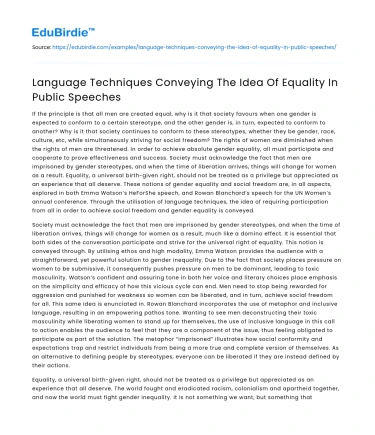If the principle is that all men are created equal, why is it that society favours when one gender is expected to conform to a certain stereotype, and the other gender is, in turn, expected to conform to another? Why is it that society continues to conform to these stereotypes, whether they be gender, race, culture, etc, while simultaneously striving for social freedom? The rights of women are diminished when the rights of men are threatened. In order to achieve absolute gender equality, all must participate and cooperate to prove effectiveness and success. Society must acknowledge the fact that men are imprisoned by gender stereotypes, and when the time of liberation arrives, things will change for women as a result. Equality, a universal birth-given right, should not be treated as a privilege but appreciated as an experience that all deserve. These notions of gender equality and social freedom are, in all aspects, explored in both Emma Watson’s HeForShe speech, and Rowan Blanchard’s speech for the UN Women’s annual conference. Through the utilisation of language techniques, the idea of requiring participation from all in order to achieve social freedom and gender equality is conveyed.
Society must acknowledge the fact that men are imprisoned by gender stereotypes, and when the time of liberation arrives, things will change for women as a result, much like a domino effect. It is essential that both sides of the conversation participate and strive for the universal right of equality. This notion is conveyed through. By utilising ethos and high modality, Emma Watson provides the audience with a straightforward, yet powerful solution to gender inequality. Due to the fact that society places pressure on women to be submissive, it consequently pushes pressure on men to be dominant, leading to toxic masculinity. Watson’s confident and assuring tone in both her voice and literary choices place emphasis on the simplicity and efficacy of how this vicious cycle can end. Men need to stop being rewarded for aggression and punished for weakness so women can be liberated, and in turn, achieve social freedom for all. This same idea is enunciated in. Rowan Blanchard incorporates the use of metaphor and inclusive language, resulting in an empowering pathos tone. Wanting to see men deconstructing their toxic masculinity while liberating women to stand up for themselves, the use of inclusive language in this call to action enables the audience to feel that they are a component of the issue, thus feeling obligated to participate as part of the solution. The metaphor “imprisoned” illustrates how social conformity and expectations trap and restrict individuals from being a more true and complete version of themselves. As an alternative to defining people by stereotypes, everyone can be liberated if they are instead defined by their actions.
Equality, a universal birth-given right, should not be treated as a privilege but appreciated as an experience that all deserve. The world fought and eradicated racism, colonialism and apartheid together, and now the world must fight gender inequality. It is not something we want, but something that we all deserve to experience as a right. In the quote. Watson expresses her desire to see women and men have the same opportunities, whether it be a social, political, or economical aspect. By basing this quote in first-person, Watson reveals her opinion on women’s rights which has been formed from anecdotal experiences. The audience is able to acknowledge that Watson is speaking through her own views, and that it even affects a privileged person like herself, which in turn, emphasises how widespread this issue is and urges the responder to take action. Similarly, Blanchard expresses this notion in. By having the same opportunities, both men and women can strive to reach their full potential. The utilisation of direct addressment conveys that absolutely everyone, including the responder, deserves to be freed from the implicit expectations of society. The issue of gender inequality is shown to be an issue where everyone is affected in some way. Additionally, gender equality is shown to be a right that is deserved by all. While gender inequality is a problem for men and women, the fight for equality is a fight for both, and will be a victory for both.
The work is universal; this issue binds everyone as humanity, regardless of race, gender, or status. Inequality does not discriminate. Gender equality, an all-encompassing idea, promotes social, economical, and political equality and has a greater chance of success if it welcomes more people into its struggle, by defeating gender stereotypes and acknowledging that both genders are affected. Watson and Blanchard eloquently express their ideas of gender equality through the use of literary techniques which illustrate both the issue and solution, whilst engaging the responder into participation. These lines encapsulate the notion of social roles. Instead of teaching males to disown their nurturing side and females to disavow aggression, both should be empowered to become catalysts for lasting change, tackling this universal human issue. In order to achieve absolute gender equality, all must participate and cooperate to prove effectiveness and success.






 Stuck on your essay?
Stuck on your essay?

